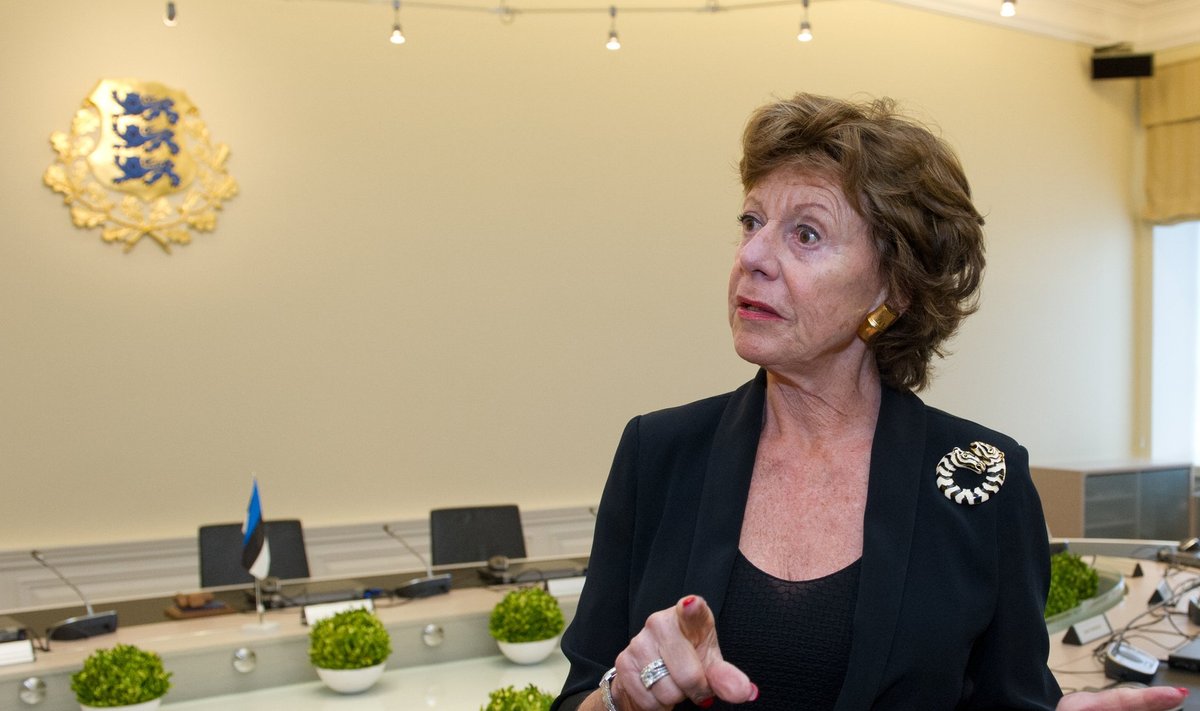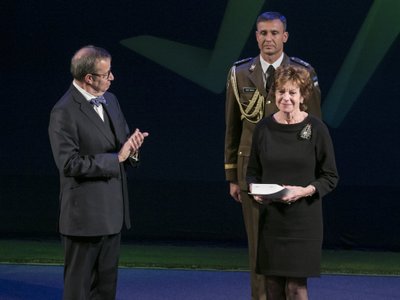INTERVIEW: Neelie Kroes hopes roaming charges within Europe will be abolished

Former European Commission Commissioner for Digital Agenda Neelie Kroes was in Estonia on 23 February to receive a decoration from Estonian president. In an interview for Eesti Päevaleht's supplement Forte she expressed confidence that the battle she launched against roaming charges would hopefully soon be won.
She also spoke of the fate of new and conflicting technology and business models - such as Uber - and how start-ups drive the economy forward.
One of the strongest reforms you implemented in the European Commission was introducing a cap on the cost of using mobile phones abroad. Where did that initiative spring from?
We have one market in Europe, and to me at least that’s our crown jewel. Not everything’s been done yet that needs to be [to make the single market a reality], but in principle at least there are no borders between economies. It’s one big part of a continent that presents economic and social opportunities to Europe. But there was one field it didn’t work in – telecommunications. So those borders still stood when your phone rang while you were abroad. And that’s ridiculous!
That for me was reason enough to take up the issue, and not just with mobile operators, but also consumer protection agencies and others. Of course I know that doing away with roaming charges means less profit for telcos, and they’re part of our game. So the whole thing had to be taken as a package: dropping roaming charges, but also more cooperation in Europe so that the telecom sector would still be ‘in good health’, as it were.
Setting a cap on prices or doing away with them altogether is frowned upon in a market economy. How much have you been forced to justify the initiative?
Not so much justify it as explain it. A lot of people didn’t even understand or know they had to pay for what is essentially a transaction between operators. It’s an issue of borders. But if there are no borders thanks to the single market, then it’s rather a contrived problem. The ‘rules of the game’ are often contrived, too.
What do you personally believe will come of the draft package and the dropping of roaming charges in the European Commission as it is today?
I’m really pleased that one of my successors is vice-president Andrus Ansip – he and I are very much on the same page. In fact there are three commissioners dealing with the area of the digital market, and I’m sure all three of them want to see an end to roaming charges once and for all.
But given that the draft package included the regulation of network neutrality and my rather realistic wording of what we mean by network neutrality, they’ll have to do some groundwork to find support for the package.
I really do hope they can see it through, because it’s not only advantages for consumers that are at stake, but the competitiveness of business and, in broader terms, Europe as a whole. It will have an effect on digitalisation, which takes in a very large part of more high-tech industry, the car industry, the computer industry, e-health and so on.

What will happen to new business models in Europe that conflict with the rules of the old economy? The best example is Uber, whose operations have been banned in a lot of countries, but there are other examples.
My political thinking is that laws and rules can’t be an end in themselves. They’re a means to an end, instruments to achieve whatever it is you’re hoping to achieve – whether that’s a healthy market economy or the protection of rights.
But history’s full of examples of reactions to innovation. When the first car appeared not everyone admired it, and the same was true of trains and planes. Ground-breaking events throughout history have generally been steps towards a brighter future. Politicians have to keep up with that and bear in mind that sometimes rules need to be changed. If all you do is hold on to yesterday, it’s difficult to offer your children a better tomorrow – and that of course is what we all aim to do.
That said, I still feel in Europe these days that if I hop into a cab I’ve booked using an app that I’m some kind of criminal…
That’s what disruption is like. It’s the same kind of change as when you no longer had to go to your street-corner travel agency to book your trip, but could arrange it yourself using your computer at home. At first it can seem very black and white [in terms of breaching valid regulations ], but rules are never the ultimate objective of politics. They’re just a tool, and sometimes they need to be changed. Sometimes we’re too slow to react in changing them, and we pay a high price for it, figuratively speaking.
All of this is part of the process of bringing Europe together, in which I’m a democrat incidentally – which is why it takes so much time. And we’re not talking here about one country’s policies, but the policies of all of Europe. We have to take into account that if we don’t act, then someone somewhere else in the world will get in before us. Some really very clever solutions are already being thought up in start-ups in Estonia, by the way: I just read about your sales software developer Erply.
You yourself are now directly involved in start-ups as part of Startup Delta. What does that involve?
The Dutch government asked me to be a special envoy for start-ups. It’s a long story, but what I’m doing is helping start-ups find new opportunities in the Netherlands and in other countries. We’re looking at what would make their lives simpler and easier, learning things from Estonia, for example, or other countries. But I’m also looking at it from the European perspective – whether, for instance, Schengen visas would help promote among start-ups entrepreneurs staying in Europe but going elsewhere on the continent rather than being forced to go to the United States.
How did it feel to be decorated here in Estonia?
I was very touched by it. I’m a great fan of Estonia and often give your country as an example of ‘no’ not being an answer – you have to grab hold of every opportunity that comes your way. Your country’s made huge strides in a number of fields, but particularly digitalisation. Receiving a decoration from such a country is very special.
I’ve worked first-hand with President Ilves, too, and that’s proven very useful. He knows what he’s talking about, and it’s not just words either – he practices what he preaches. I once asked him to join me in a meeting with Herman van Rompuy, who’s also a strong supporter of digitalisation, to explain digital signature to him. And he did, and very enthusiastically! He gave a proper lecture on it; you might even say a full training course! That’s what your president’s like, and he’s not only a great ambassador for Estonia, but for digitalisation as a whole.